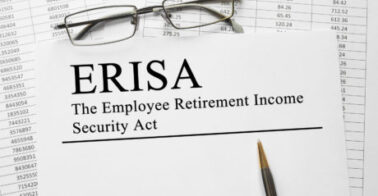Three Helpful Considerations for Plan Fiduciaries During COVID-19


ERISA fiduciaries are steadily fine-tuning their decision-making processes in the face of the coronavirus epidemic. Any fiduciary decisions executed during this tumorous period may be particularly ripe for dispute by plan participants or regulators. To combat potential disagreements, fiduciaries can better position themselves in regulatory investigations or litigation by crafting a methodical record of sensible adjustments to their fiduciary duties in order to stay one step ahead of the COVID-19 economic and societal volatility. As such, we’ve pinpointed three key measures that can help retirement plan fiduciaries continue to successfully adapt to the current arduous circumstances.
1. Examine Pandemic Vigilance with Investment Advisors and Managers
To make sure ERISA plan fiduciaries are effectively handling the disruption to their daily duties, fiduciaries can reach out to the employee benefit plan’s service providers for advice on where certain activities stand. This includes the provider’s ability to continue managing plan assets during this period of time, as well as queries on the operational disruption or the role of key personnel. Plan fiduciaries may also want to study investment continuity, such as a manager’s capability to continue redemptions, purchases, and valuations during this disruption and future ones as well. This strategy will highlight to your plan participants your willingness to adjust to future societal and economic disrupts and your desire to continue investment-related operations through this pandemic.
2. Review and Monitor Plan Investments to Emphasize Readiness for Unpredictable Marketplace
Subsequent to examining provider operations, fiduciaries can conduct a thorough review of plan investments. During this time of uncertainty, it is advisable for plan fiduciaries to consider whether certain investments remain practical in the current market setting. Suitable reflections include whether plan investments should be modified to decrease options with more risk, or to eradicate particular asset classes expected to perform poorly in a fickle market. Correspondingly, re-balancing among asset classes to uphold the plans desired assets, diligently watching the performance of plan investments and stock performances, are other sharp tactics plan fiduciaries can utilize to confirm the stability of said investments.
3. Carefully Evaluate the Plan’s Fraud Defense Measures
Another course-of-action for fiduciaries is to review the competence of a plan’s fraud protection tools. The COVID-19 pandemic has spawned a significant increase in fraud activities due to economic disruption and a surge in electronic communication in establishments across the globe. As such, benefit plans become a prime target for hackers to steal data and assets held by said plans. This personal information, like social security numbers, retirement assets, or access to personal financial accounts can be swiped in minutes. In light of these risks, a proactive move for plan fiduciaries is to fully grasp the current security structures set in place to protect the company’s plan and how to best expand on these measures if needed.
If you are involved in the management of an employee retirement plan, you can face personal exposure to claims alleging breach of fiduciary duty. Colonial Surety Company offers fiduciary liability insurance for plan sponsors in our ERISA fidelity bond packages, which come with an ERISA bond, fiduciary liability insurance, and cyber liability insurance. Cyber liability insurance protects the business and plan from cyber breaches. Fully protect your plan, yourself, and your company all in one place, instantly online. Contact us today to get your coverage online, instantly.

